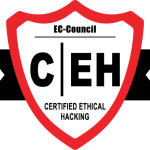Certified Ethical Hacker (CEH) - EC-Council
Course Overview

The Certified Ethical Hacker (CEH) program by EC-Council is a globally recognized certification designed to empower cybersecurity professionals with the skills to think and act like a hacker while adhering to ethical and legal guidelines. This course provides an in-depth understanding of the tactics, techniques, and tools used by malicious hackers to breach systems, networks, and applications.
Participants will master the five phases of ethical hacking—reconnaissance, scanning, gaining access, maintaining access, and covering tracks—through comprehensive hands-on labs and simulations. The CEH course emphasizes a practical approach, using real-world scenarios to teach participants how to identify vulnerabilities, assess risks, and implement robust security measures to protect against cyber threats.
As technology evolves, so do cyber threats, making this certification critical for professionals seeking to stay ahead in the ever-changing cybersecurity landscape. The program also introduces learners to cutting-edge tools, the latest hacking techniques, and countermeasures to fortify an organization’s defenses. Whether working in penetration testing, risk assessment, or security operations, CEH certification equips individuals with the expertise to safeguard critical infrastructure effectively.
Our program includes:
- Comprehensive training on the BABOK and the CBAP exam
- Study materials and practice exams to help you prepare for the exam
- Mentorship and support throughout the certification process
- Virtual or on-site training options to fit your schedule and learning style
Quick Links
Pre-requisite
- Basic knowledge of IT systems and networking is recommended.
- While not mandatory, prior experience in cybersecurity or completion of EC-Council’s CCT or equivalent foundational certification is beneficial.
Benefits
- Globally Recognized Certification: CEH is a respected credential that validates your expertise in ethical hacking.
- Hands-On Skills: Gain practical experience through real-world labs and simulations.
- Advanced Knowledge: Learn the latest hacking tools, exploits, and countermeasures.
- Career Growth: Qualify for roles like Ethical Hacker, Penetration Tester, or Cybersecurity Analyst.
- Legal Expertise: Understand the ethical and legal boundaries of hacking, ensuring compliance with regulations.
What You Will Learn in This Course
Introduction to Ethical Hacking
- Understand the role of ethical hackers and their importance in protecting systems.
- Learn the five phases of hacking: reconnaissance, scanning, gaining access, maintaining access, and covering tracks.
Footprinting and Reconnaissance
- Techniques for gathering information about targets through open-source intelligence (OSINT).
- Learn tools and methodologies for active and passive reconnaissance.
Scanning Networks
- Master scanning techniques to identify live hosts, open ports, and vulnerabilities.
- Learn to use tools like Nmap and Nessus for network assessment.
Enumeration and Vulnerability Analysis
- Understand methods for extracting user names, network shares, and more from a target.
- Learn to assess vulnerabilities and determine potential attack vectors.
System Hacking
- Explore password cracking, privilege escalation, and session hijacking techniques.
- Learn countermeasures to protect against these attacks.
Malware Threats
- Identify and analyze malware, including viruses, worms, and Trojans.
- Understand methods for creating and deploying malware in a controlled environment.
Sniffing and Social Engineering
- Learn techniques to intercept and analyze network traffic.
- Understand psychological manipulation tactics used to gain unauthorized access.
Denial of Service (DoS) and Session Hijacking
- Explore tools and techniques for launching and mitigating DoS and DDoS attacks.
- Understand how attackers hijack active sessions and methods to prevent it.
Web Application Hacking
- Learn to identify and exploit vulnerabilities in web applications, such as SQL injection and XSS.
- Master tools like Burp Suite and OWASP ZAP for web security assessments.
Hacking Wireless Networks and IoT Devices
- Explore methods for compromising Wi-Fi networks and Internet of Things (IoT) devices.
- Learn encryption protocols and tools for wireless penetration testing.
Cryptography and Cloud Security
- Understand encryption techniques, digital signatures, and their applications in cybersecurity.
- Learn about securing cloud environments and assessing their vulnerabilities.
Who Should Take This Course?
- IT Professionals: System administrators, network engineers, and security professionals seeking to enhance their cybersecurity expertise.
- Penetration Testers: Individuals performing vulnerability assessments and ethical hacking tasks.
- Security Enthusiasts: Anyone passionate about learning the techniques of ethical hacking.
- Students and Graduates: Individuals pursuing careers in cybersecurity.
- IT Managers and Executives: Professionals responsible for securing organizational systems and networks.
